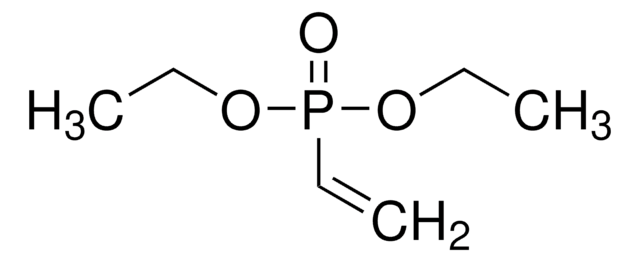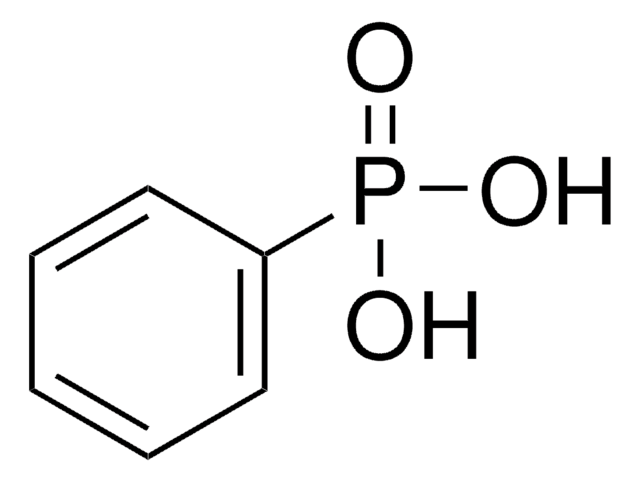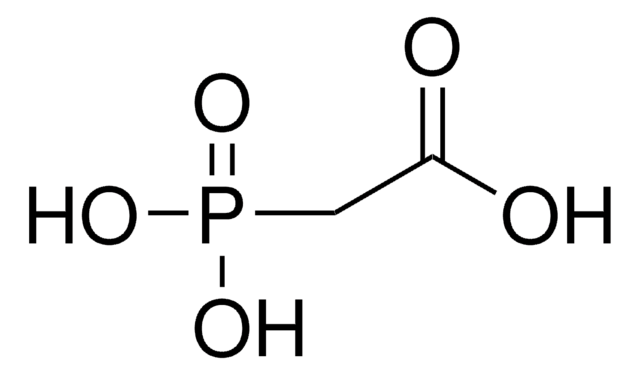672068
Vinylphosphonic acid
≥90% (T)
Synonym(s):
Ethenephosphonic acid, Ethylenephosphonic acid, P-Ethenylphosphonic acid
Sign Into View Organizational & Contract Pricing
All Photos(1)
About This Item
Linear Formula:
CH2=CHP(O)(OH)2
CAS Number:
Molecular Weight:
108.03
Beilstein:
1741622
EC Number:
MDL number:
UNSPSC Code:
12352100
PubChem Substance ID:
NACRES:
NA.22
Recommended Products
Quality Level
Assay
≥90% (T)
impurities
≤7.0% water
mp
36 °C (Lit. dry VPA) (lit.)
density
1.37 g/mL at 20 °C (lit.)
SMILES string
OP(O)(=O)C=C
InChI
1S/C2H5O3P/c1-2-6(3,4)5/h2H,1H2,(H2,3,4,5)
InChI key
ZTWTYVWXUKTLCP-UHFFFAOYSA-N
Looking for similar products? Visit Product Comparison Guide
Related Categories
Application
Vinylphosphonic acid (VPA) can be used as a monomer unit for the synthesis of poly(vinylphosphonic acid) via free radical polymerization. It is also used to develop copolymers of VPA with acrylonitrile, N-isopropylacrylamide, styrene, vinylpyrrolidone, and acrylic and methacrylic acid. These copolymers find potential application in hydrogels, drug delivery, biomimetic mineralization, and polymer electrolyte membranes in fuel cells.
It can also be used as an organic building block to prepare (E)-styryl phosphonic acid derivatives by reacting with various aryl halides via Pd-catalyzed Heck coupling reaction.
It can also be used as an organic building block to prepare (E)-styryl phosphonic acid derivatives by reacting with various aryl halides via Pd-catalyzed Heck coupling reaction.
Signal Word
Danger
Hazard Statements
Precautionary Statements
Hazard Classifications
Met. Corr. 1 - Skin Corr. 1B
Storage Class Code
8A - Combustible corrosive hazardous materials
WGK
WGK 1
Flash Point(F)
467.6 °F
Flash Point(C)
242 °C
Personal Protective Equipment
dust mask type N95 (US), Eyeshields, Gloves
Choose from one of the most recent versions:
Already Own This Product?
Find documentation for the products that you have recently purchased in the Document Library.
Customers Also Viewed
Single-step synthesis of styryl phosphonic acids via palladium-catalyzed Heck coupling of vinyl phosphonic acid with aryl halides
McNichols BW, et al.
Chemical Communications (Cambridge, England), 53(92), 12454-12456 (2017)
Patrick L Garcia et al.
Nucleic acids research, 32(12), 3771-3778 (2004-07-17)
Bloom (BLM) and Werner (WRN) syndrome proteins are members of the RecQ family of SF2 DNA helicases. In this paper, we show that restricting the rotational DNA backbone flexibility, by introducing vinylphosphonate internucleotide linkages in the translocating DNA strand, inhibits
Elise Claveau et al.
The Journal of organic chemistry, 72(13), 4832-4836 (2007-05-18)
In the course of our investigations on the synthesis of new nitrogen heterocyclic derivatives, we were interested in the synthesis and study of new 1,4-oxazine rings. To this aim, the desired bisvinylphosphate was prepared from N-Boc morpholine-3,5-dione and was then
Xuequan Lu et al.
The Journal of organic chemistry, 74(8), 3192-3195 (2009-03-20)
The first enantioselective synthesis of chiral isosteric phosphonate analogues of FTY720 is described. One of these analogues, FTY720-(E)-vinylphosphonate (S)-5, but not its R enantiomer, elicited a potent antiapoptotic effect in intestinal epithelial cells, suggesting that it exerts its action via
Zara A Doddridge et al.
Biochemistry, 42(11), 3239-3246 (2003-03-19)
We have previously reported the synthesis of vinylphosphonate-linked thymidine dimers and their incorporation into synthetic oligonucleotides to create vinylphosphonate internucleotide linkages in the DNA. Such linkages have a profound effect on DNA backbone rotational flexibility, and we have shown that
Our team of scientists has experience in all areas of research including Life Science, Material Science, Chemical Synthesis, Chromatography, Analytical and many others.
Contact Technical Service



![Bis[2-(methacryloyloxy)ethyl] phosphate](/deepweb/assets/sigmaaldrich/product/structures/128/336/4e7a3e38-338c-423e-95b8-70d9d1f8e121/640/4e7a3e38-338c-423e-95b8-70d9d1f8e121.png)









